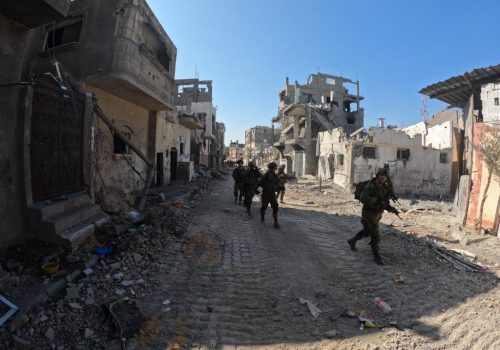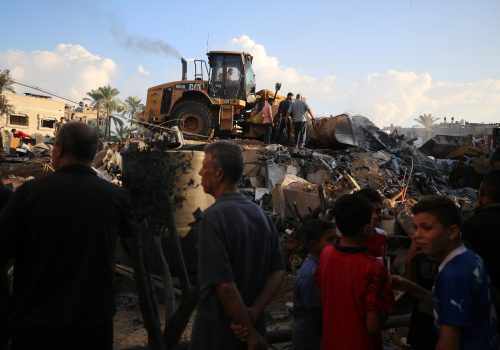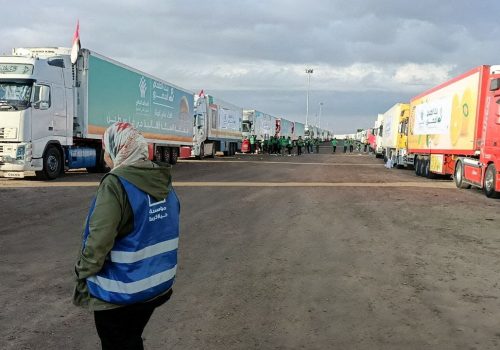Unpacking the UN findings of war crimes by Hamas and Israel since October 7
In June, the United Nations (UN) Independent International Commission of Inquiry on the Occupied Palestinian Territory, including East Jerusalem, and Israel (COI) issued a report examining violations of international human rights law, humanitarian law, and criminal law committed by all parties to the Israel-Hamas conflict from October 7, 2023, to December 31, 2023. The report was accompanied by one supplemental document detailing findings on attacks in Israel and another detailing findings on attacks in Palestinian territory.
This is the first international investigative report presenting factual findings and legal conclusions on violations during the conflict. The COI found that Hamas and other Palestinian militants committed war crimes and violated international humanitarian and human rights law in their October 7, 2023, attack, and Israeli authorities and security forces committed war crimes and crimes against humanity, and violated international humanitarian and human rights law, in their military campaign in the Gaza Strip. These findings and the robust evidence backing them may support future accountability proceedings.
About the COI
The UN Human Rights Council established the COI in May 2021, mandating it to investigate all alleged violations of international humanitarian and human rights law in Palestinian territories and Israel leading up to and since April 13, 2021—a date marking an increase in protests and violence in Jerusalem, the West Bank, and Gaza sparked by disruptions at the al-Aqsa Mosque and the anticipated eviction of Palestinian families from East Jerusalem.
SIGN UP FOR THIS WEEK IN THE MIDEAST NEWSLETTER
The COI is led by three independent and impartial experts, supported by a team of investigators and analysts. The standard of proof is “reasonable grounds,” following most other UN human rights investigative bodies, including those on Myanmar, Syria, Ukraine, and Venezuela. Facts are reported “where, based on a body of verified information, an objective and ordinary prudent observer would have reasonable grounds to conclude that the facts took place as described,” and legal conclusions are reported where “facts meet all the elements of a violation or abuse.”
The COI based its June report on thousands of forensically verified open-source items, more than 350 items received from public calls for submissions, and witness and survivor interviews in Turkey and Egypt, where individuals had fled, as well as remotely. The COI sent one request for information to the state of Palestine (represented by the Palestine Liberation Organization), which provided “extensive comments.” Israel did not respond to the COI’s six requests for information and access to the territory. However, officials denounced the COI, alleging prejudice and antisemitism—echoing allegations from prior UN investigative mandates concerning Israel—and reportedly restricted witness communication.
October 7, 2023, attack
The COI found that members of Hamas’s military wing, other Palestinian armed groups, and Palestinian civilians committed war crimes and violated international humanitarian and human rights law in their October 7, 2023, attack.
The COI detailed the war crimes of murder and intentionally directing attacks on civilians, committed by shooting and killing eight hundred civilians at twenty-four kibbutzim and civilian locations on October 7, 2023. The report details the horrific methods by which militants killed—systematically moving from house to house, shooting at hiding and fleeing civilians, setting homes on fire, and killing civilians at a music festival, in public toilets, in public shelters, and at bus stops and along roads. Among the dead were forty children, including a nine-month-old shot and killed while hiding with her mother, and 130 people aged sixty-five and older. Through these acts, militants also committed the war crimes of torture and cruel or inhuman treatment and destroying or seizing the property of an adversary. The COI also described unlawful attacks at military outposts, including killings of soldiers who were hors de combat.
Palestinian militants’ indiscriminate rocket fire toward populated places in Israel—killing eighteen civilians on October 7, 2023, and in following weeks—also constitutes the war crimes of murder and intentionally directing attacks on civilians.
Palestinian fighters also committed the war crime of outrages upon personal dignity by desecrating corpses, including burning, mutilating, lacerating, decapitating, and undressing and subsequently exhibiting bodies.
The COI confirmed acts of sexual violence against women and men at the Nova music festival, Route 232, Nahal Oz military base, and kibbutzim Re’im, Nir Oz, and Kfar Aza on October 7, 2023. Evidence included restraints placed on women, positions of and signs of violence on victims’ bodies, and disseminated imagery of undressed bodies. The COI also found that gender-based violence was “perpetrated in similar ways in several locations and by multiple Palestinian perpetrators,” with patterns including abducting women with force or threats, coerced close physical proximity to abductors, treatment of women’s bodies as “victory trophies,” and gendered slurs. The COI could not verify reports of rape, sexualized torture, and genital mutilation due to lack of access to victims, witnesses, and crime sites, nor did it find evidence that militants were ordered to commit sexual violence.
Finally, the COI found that militants committed the war crime of taking hostages—often combined with outrages upon personal dignity and inhumane treatment, including sexual and gender-based violence, assault, harassment, and intimidation—by abducting 252 people from Israel (approximately twenty security forces and the remainder civilians, including thirty-six children) and brought them to Gaza. As of May 21, half of the hostages were released or rescued, with the remainder in captivity, whether alive or dead.
Military response in Gaza
The COI found that Israeli authorities and members of the security forces committed war crimes and crimes against humanity, and violated international humanitarian and human rights law, in their military campaign in Gaza.
Israeli authorities and forces perpetrated the war crime of starvation as a method of warfare, evidenced by the imposition of a total siege for two weeks, from approximately October 9 to 20—with water shut off and no aid allowed in—followed by meager aid deliveries, with measures hampering entry of aid and restricting or blocking specific items. The COI concluded that authorities imposed the siege as retribution for militants’ October 7, 2023, attack and that aid restrictions were intended “to instrumentalize and weaponize the provision of necessities” and hold hostage the Gazan population “to achieve political and military objectives,” constituting collective punishment of Palestinians in Gaza. Israeli forces also attacked humanitarian convoys, further limiting aid availability and distribution.
Israeli authorities and forces also committed “[e]xtermination, as a crime against humanity”—”the killing one or more persons, including by inflicting conditions of life calculated to bring about the destruction of part of a population, … [as] part of a mass killing of members of a civilian population”—based on attacks on civilians and humanitarian aid restrictions.
Israeli authorities and forces also committed the war crimes of murder and intentionally directing attacks against civilians and civilian objects, as well as the crime against humanity of murder. Israeli officials’ statements evidence permissive changes in targeting practices—launching more strikes than in prior conflicts, targeting locations with “an inkling of intelligence,” and using more intense weaponry with wider impact areas—resulting in significantly higher casualties than in prior Israel-Hamas conflicts and a higher proportion of women and children killed. The report detailed instances in which Israeli forces targeted civilians who were clearly unarmed, including civilians sheltering at a church, a child holding a white flag, and three unarmed Israeli hostages. The COI also found Israel’s military campaign consistent with the Dahya doctrine, a military strategy to use “overwhelming and disproportionate force against civilian areas and infrastructure” to defeat the enemy.
The COI noted it continues to investigate reports that Hamas and other militants operate from civilian locations, but it could not verify evidence Israeli authorities publicly presented. The COI made no finding regarding Hamas’s use of human shields.
The COI found that Israeli evacuation orders constituted the war crime and crime against humanity of forcible transfer. From October 7, 2023, to December 30, 2023, more than eighty orders instructed civilians to leave their neighborhoods and go to areas that effectively constituted safe zones with legal protections. However, many evacuation orders were unclear and confusing, had insufficient or unstated time frames, and/or were difficult or impossible to comply with due to chaos along evacuation routes—including Israeli checkpoints where individuals were forced at gunpoint to strip and “walk for prolonged periods without clothes,” a lack of transport, inadequate support for vulnerable persons, and Israeli and Hamas attacks on and harassment of evacuees. Moreover, evacuation orders were issued alongside or in the context of authorities’ statements dehumanizing Palestinians, labeling all Gazans as Hamas, referring to the second Nakba, and calling for the removal of Gazan civilians and the establishment of Israeli settlements. Accordingly, the evacuation orders did not constitute an advance effective warning to civilians, but instead amounted to forcible transfer. Israeli forces also attacked safe zones and destroyed entire communities and residential areas that were evacuated, leaving nothing for families to return to.
The COI also documented Israeli forces’ commission of the war crimes of sexual violence, outrages upon personal dignity, and sexual and gender-based violence amounting to torture or inhuman and cruel treatment, as well as the crimes against humanity of gender persecution and torture and inhuman and cruel treatment. Israeli forces compelled public stripping and nudity “in many locations,” with victims “blindfolded, kneeling, and/or with their hands tied” while subject to interrogation, verbal or psychological abuse, and/or coerced physical acts. “[M]en and boys were targeted in particular ways,” including Israeli forces repeatedly filming and photographing them with images disseminated online and family and community members forced to watch. Women were also targeted with specific forms of psychological violence and sexual harassment, including online shaming and doxing, sexualized graffiti, and invasion of personal privacy, including by soldiers rifling through lingerie. These acts were aggravated by violating Gazans’ modest and private social practices and disseminating humiliating content online that would be almost impossible to remove. The COI concluded that the sexual and gender-based violence “was intended to humiliate and degrade the Palestinian population as a whole.” The pattern of forced public stripping and nudity indicated it was either ordered or condoned, and the prevalence and severity of sexual and gender-based crimes suggest they are part of Israeli operating procedures.
Impact of the report
The COI is not a court or a tribunal, and it cannot prosecute or ensure legal accountability. However, it can issue recommendations to promote accountability and support accountability mechanisms, including by sharing evidence with domestic, regional, and international courts. Thus, while the report itself will not result in trials, its documentation can advance investigations and contribute to future prosecutions of Palestinian and Israeli forces and authorities. These cases may proceed at the International Criminal Court (ICC)—where the prosecutor has applied for arrest warrants for Hamas and Israeli officials—or in domestic courts. The COI is also recommending these accountability steps—that ICC member states support and cooperate fully with the Office of the Prosecutor’s investigation and that states parties to the Geneva Conventions, Convention against Torture, and the Genocide Convention investigate core international crimes under domestic or universal jurisdiction.
While investigations and prosecutions may take years, legal accountability is essential to recovering and healing from a conflict that has resulted in “months of losses and despair, retribution and atrocities.” As the COI concluded: “The only way to stop the recurring cycles of violence…is to ensure strict adherence to international law.”
Elise Baker is a staff lawyer with the Atlantic Council’s Strategic Litigation Project. Previously, she worked at the United Nations International, Impartial and Independent Mechanism on Syria and led Physicians for Human Rights’ Syria Mapping Project, which documented attacks on Syria’s health care system.
Further reading
Tue, Oct 31, 2023
Israel claims it is no longer occupying the Gaza Strip. What does international law say?
MENASource By Celeste Kmiotek
The laws of occupation codify a basic principle of humanity: those with effective control over a population have obligations to protect it.
Mon, Oct 16, 2023
Hamas’s actions are war crimes. Israel should not respond with further war crimes.
MENASource By Elise Baker
There are clear indications that both Hamas and the IDF have violated international humanitarian law, and some of their attacks constitute grave violations.
Wed, Oct 18, 2023
Humanitarian aid cannot be weaponized. Gazans are depending on it.
MENASource By Lisandra Novo
Despite urgent appeals for aid and multiple deliveries to Egypt, no outside aid appears to have made it into Gaza.
Image: FILE PHOTO: Smoke rises following Israeli strikes during an Israeli military operation, amid Israel-Hamas conflict, in Khan Younis, in the southern Gaza Strip, July 24, 2024. REUTERS/Hatem Khaled/File Photo


